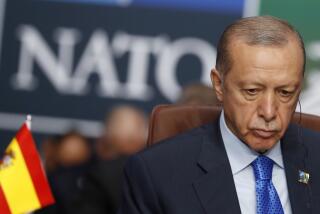Turkey Hopes to Send Forces to Northern Iraq
- Share via
ANKARA, Turkey — Under strong U.S. pressure, the government asked parliament Wednesday to open Turkey’s airspace to American missiles and warplanes, but it defied the Bush administration by adding a request to send two brigades of Turkish troops into Iraq’s Kurdish-controlled region.
The decision ended months of aggressive lobbying by President Bush and his senior aides to win Turkish approval, in exchange for billions of dollars in grants, for the deployment of U.S. ground troops bound for Iraq and the use of Turkish air bases for American bombing raids.
“These issues -- and the financial aid -- are a thing of the past,” Prime Minister Recep Tayyip Erdogan told reporters.
The country’s recession-worn economy reeled Wednesday from the loss of the expected aid. The leading stock index dropped 6%. And Turkey faced a breach with its powerful NATO ally as parliament moved toward a likely vote today on a military incursion that, rather than supporting the U.S.-led invasion, would seek to protect Turkish interests in northern Iraq.
Fearing a “war within a war” between Turkish troops and Iraqi Kurdish militias who support the United States against Saddam Hussein, American officials and Iraqi Kurdish leaders failed again Wednesday to persuade the Turks to keep their troops home.
After a flurry of phone calls between Washington and Turkish officials in Ankara, Justice Minister Cemil Cicek said the Americans had privately accepted the idea of a Turkish incursion. A senior U.S. official denied that.
“There’s no American green light,” the official said.
Under U.S. prodding, Turkey agreed Tuesday to take part with the Americans and the Kurds in a crisis management committee that would try to minimize the risk of clashes in northern Iraq. But the body, which would include a Turkish army colonel and an American officer of similar rank, is not yet operating.
The motion Erdogan sent to parliament would open 11 air corridors over Turkey for U.S. bombers and missiles, Turkish newspapers said. Parliament’s assent, which is expected, would enable planes based on two U.S. aircraft carriers in the eastern Mediterranean to fly the most direct route to Baghdad.
Turkey’s relations with the United States have been under strain since parliament March 1 refused by three votes to let 62,000 American troops cross Turkish territory to set up a northern front against Hussein’s army. With Turkey’s populace strongly opposed to a war, Erdogan was reluctant to ask parliament to reconsider -- until Bush and Vice President Dick Cheney phoned him last week to press for overflight rights.
U.S. Secretary of State Colin L. Powell made it clear that Turkey would get none of the U.S. aid for opening its air corridors. But late Tuesday, he asked Turkish Foreign Minister Abdullah Gul to consider air base rights for bombers as well, the newspaper Hurriyet reported today.
In turn, Gul asked Powell to put at least some of the promised aid money back on the table, the newspaper reported. With Turkish officials waiting up for a decision, it said, Powell called back at 1:30 a.m. Wednesday to say that Washington wanted a quick vote on overflights.
“With war so close, the Americans did not want to engage in another drawn-out bargaining process with the Turks,” said Sedat Ergin, the Hurriyet columnist who reported the conversations.
A U.S. official in Washington, who confirmed the account, said the prospect of using Turkey as the base for an offensive against northern Iraq was dead for now. The Pentagon plans to drop U.S. paratroopers into northern Iraq, but the administration might revive the idea of moving ground troops and tanks through Turkey if the assault on Iraq goes slowly or poorly.
The motion before parliament would authorize about 20,000 Turkish troops to cross the country’s 206-mile southern border into Iraq. Turkish officials have said the troops are needed to control a potential flood of Iraqi refugees and disarm Turkish Kurd separatists hiding in Iraqi territory.
Iraqi Kurdish leaders say Turkey’s real motive is to intimidate their autonomous institutions in northern Iraq, a region under the protection of U.S. and British aircraft enforcing a “no-fly” zone there. Turkish officials fear that permanent autonomy for Kurds in postwar Iraq would revive separatist demands among Kurds in Turkey.
Interviewed Wednesday on CNN’s Turkish-language station, Jalal Talabani, leader of Iraq’s Patriotic Union of Kurdistan, reaffirmed the Kurds’ loyalty to a federated Iraqi state and appealed directly to Turkish soldiers to stay away.
A U.S. mission led by presidential envoy Zalmay Khalilzad, meeting here with Turkish and Iraqi Kurdish leaders, reported progress in easing some of Turkey’s security concerns. The Kurds called on their followers not to seize Iraqi oil fields or personal property taken from them by Hussein’s regime.
*
Times staff writer Robin Wright in Washington contributed to this report.
More to Read
Sign up for Essential California
The most important California stories and recommendations in your inbox every morning.
You may occasionally receive promotional content from the Los Angeles Times.













